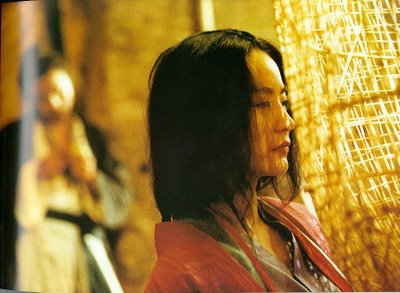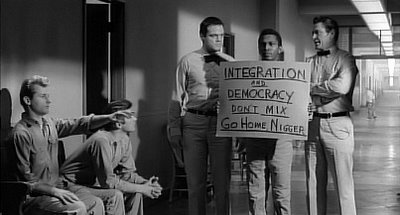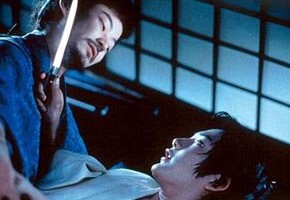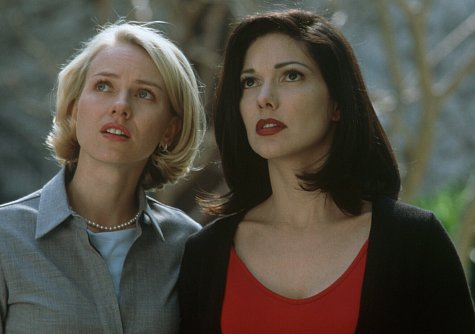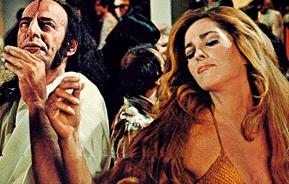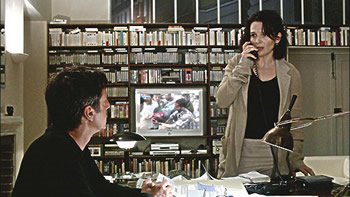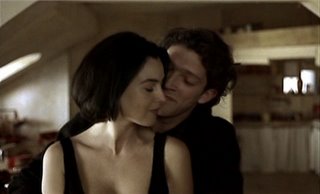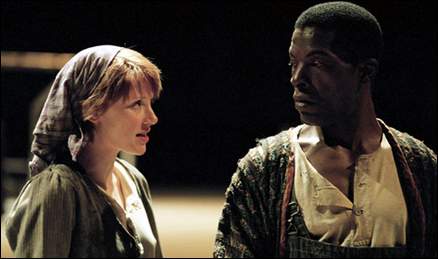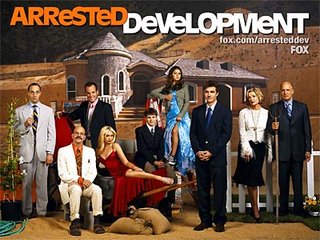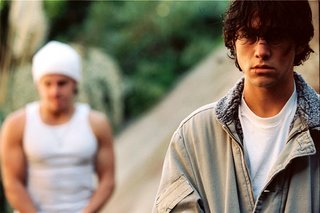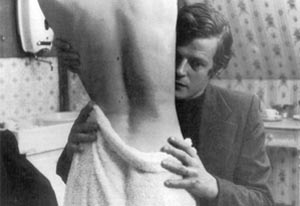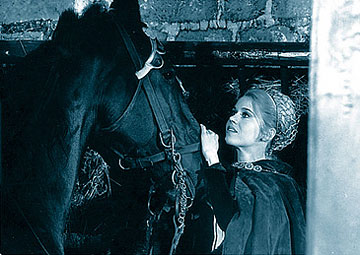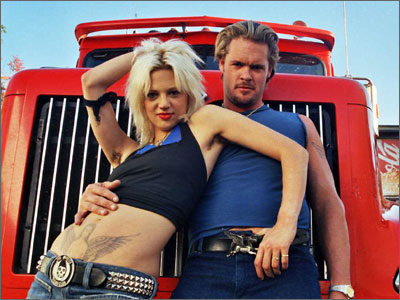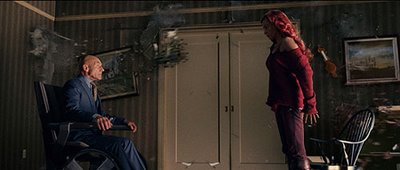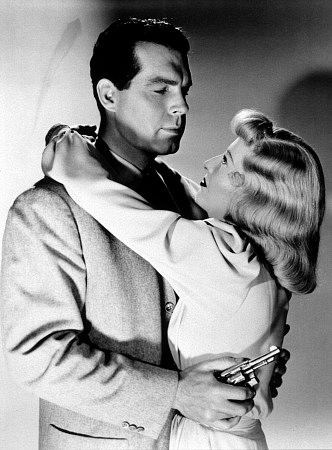 I don't know how I forgot to mention the upcoming DVD release of one of my all-time favorites, Billy Wilder's Double Indemnity, perhaps the quintessential film noir, starring Fred MacMurray and the amazing Barbara Stanwyck. The "Universal Classic" disc comes out August 22nd and includes the sure-to-be-dreadful 1973 made-for-TV remake, with Samantha Eggar in the classic Stanwyck role.
I don't know how I forgot to mention the upcoming DVD release of one of my all-time favorites, Billy Wilder's Double Indemnity, perhaps the quintessential film noir, starring Fred MacMurray and the amazing Barbara Stanwyck. The "Universal Classic" disc comes out August 22nd and includes the sure-to-be-dreadful 1973 made-for-TV remake, with Samantha Eggar in the classic Stanwyck role. The Notorious Bettie Page was big news before it came out, and then everyone forgot about it. Well, it'll be on DVD September 26th. The film stars Gretchen Mol, who, supposedly, does a good job though no one would have guessed the waifish blonde former Hollywood starlet could accurately portray the busty Page. Mary Harron (I Shot Andy Warhol, American Psycho) directs.
The Notorious Bettie Page was big news before it came out, and then everyone forgot about it. Well, it'll be on DVD September 26th. The film stars Gretchen Mol, who, supposedly, does a good job though no one would have guessed the waifish blonde former Hollywood starlet could accurately portray the busty Page. Mary Harron (I Shot Andy Warhol, American Psycho) directs.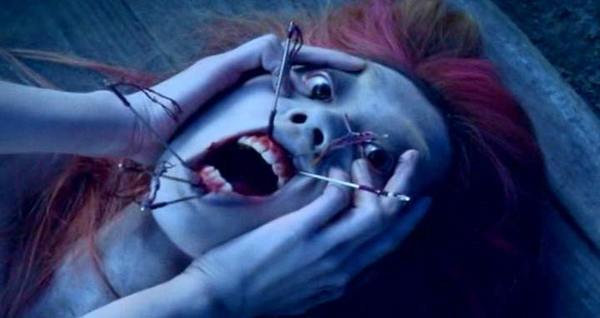 The final episode of Showtime's Masters of Horror series (which featured hour long films from Dario Argento, John Carpenter, John McNaughton, and Stuart Gordon) entitled Imprint will be on DVD September 26th. Directed by Takashi Miike (Audition, Ichi the Killer), Imprint was banned from being aired on Showtime, so this'll be the first time we'll be able to see it.
The final episode of Showtime's Masters of Horror series (which featured hour long films from Dario Argento, John Carpenter, John McNaughton, and Stuart Gordon) entitled Imprint will be on DVD September 26th. Directed by Takashi Miike (Audition, Ichi the Killer), Imprint was banned from being aired on Showtime, so this'll be the first time we'll be able to see it. On September 5th, Wellspring is releasing Unknown White Male, a British documentary about a man suffering from amnesia.
On September 5th, Wellspring is releasing Unknown White Male, a British documentary about a man suffering from amnesia. Hopefully you don't care, but I'll let you know in case you secretly do. The sequel to L'Auberge espagnole, Russian Dolls (Les Poupées russes), will be on DVD, from IFC Films, on the 26th of September. Romain Duris reprises his role, alongside Cécile de France and (yep) Audrey Tautou.
Hopefully you don't care, but I'll let you know in case you secretly do. The sequel to L'Auberge espagnole, Russian Dolls (Les Poupées russes), will be on DVD, from IFC Films, on the 26th of September. Romain Duris reprises his role, alongside Cécile de France and (yep) Audrey Tautou. If you prefer your French cinema a little less Audrey Tautou and a little more Haneke-esque, Strand is releasing Lemming on August 15th. The film was one of the front-runners of the Cannes film festival last year, but was probably overlooked due to its similarities with Caché. Lemming stars two French-speaking Anglo Charlottes (Rampling and Gainsbourg) and Laurent Lucas in director Dominik Moll's follow-up to his overrated With a Friend Like Harry... (Harry, un ami qui vous veut du bien).
If you prefer your French cinema a little less Audrey Tautou and a little more Haneke-esque, Strand is releasing Lemming on August 15th. The film was one of the front-runners of the Cannes film festival last year, but was probably overlooked due to its similarities with Caché. Lemming stars two French-speaking Anglo Charlottes (Rampling and Gainsbourg) and Laurent Lucas in director Dominik Moll's follow-up to his overrated With a Friend Like Harry... (Harry, un ami qui vous veut du bien). On the subject of Cannes, Theo Angelopoulos' Palme d'Or winning Eternity and a Day (Mia aioniotita kai mia mera) will be released by New Yorker on the same day as Lemming. As it's a New Yorker release, you might expect a shitty PAL-to-NTSC transfer without features and perhaps even a release date delay (as that's how they like to roll).
On the subject of Cannes, Theo Angelopoulos' Palme d'Or winning Eternity and a Day (Mia aioniotita kai mia mera) will be released by New Yorker on the same day as Lemming. As it's a New Yorker release, you might expect a shitty PAL-to-NTSC transfer without features and perhaps even a release date delay (as that's how they like to roll). Magnolia will release the Australian import Somersault on July 27th, from director Cate Shortland. My friend Brad referred to it as My Winter of Love, and though it was made the same year as the lovely My Summer of Love, the distance in US releases (and the fact that no one really saw either film) has kept the unpleasant comparisons at bay.
Magnolia will release the Australian import Somersault on July 27th, from director Cate Shortland. My friend Brad referred to it as My Winter of Love, and though it was made the same year as the lovely My Summer of Love, the distance in US releases (and the fact that no one really saw either film) has kept the unpleasant comparisons at bay. For those die-hard Parker Posey fans and those who remember her when, TLA Releasing will have Adam & Steve on the shelves August 8th. If you actually care about the premise, it's about two gay men who meet one another, unaware of their unsuccessful one night stand fifteen years prior. If you only care about Parker, it's supposed to be the closest thing to the Parker we all knew and loved in Party Girl and The House of Yes. Writer/director Craig Chester did the smart thing in giving her lines that only she could deliver like, "I'm sweatin' like Whitney Huston going through customs." She's supposedly making a comeback this year, so if that fails then maybe you can just watch Adam & Steve and remember the good ol' times.
For those die-hard Parker Posey fans and those who remember her when, TLA Releasing will have Adam & Steve on the shelves August 8th. If you actually care about the premise, it's about two gay men who meet one another, unaware of their unsuccessful one night stand fifteen years prior. If you only care about Parker, it's supposed to be the closest thing to the Parker we all knew and loved in Party Girl and The House of Yes. Writer/director Craig Chester did the smart thing in giving her lines that only she could deliver like, "I'm sweatin' like Whitney Huston going through customs." She's supposedly making a comeback this year, so if that fails then maybe you can just watch Adam & Steve and remember the good ol' times. Though you could look on your own by visiting their website, Criterion's fall line-up so far includes re-releases of The Seven Samurai, Amarcord, and Brazil. I'm still waiting for a rerelease of The Naked Kiss and Andrei Rublev. But I'll keep my fingers crossed.
Though you could look on your own by visiting their website, Criterion's fall line-up so far includes re-releases of The Seven Samurai, Amarcord, and Brazil. I'm still waiting for a rerelease of The Naked Kiss and Andrei Rublev. But I'll keep my fingers crossed.Rumor Mill:
 According to a website whose address I've since lost, Paramount will be releasing the first and second season of Twin Peaks in Australia this September. The website stated that there may be hope for Twin Peaks season 2 in November, but a rerelease of season 1, with the pilot (that hopefully doesn't have that awful ending tacked on), has not been mentioned.
According to a website whose address I've since lost, Paramount will be releasing the first and second season of Twin Peaks in Australia this September. The website stated that there may be hope for Twin Peaks season 2 in November, but a rerelease of season 1, with the pilot (that hopefully doesn't have that awful ending tacked on), has not been mentioned.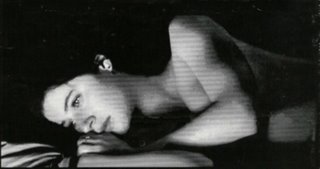 On the Criterion front, it's been mentioned that they're working on a disc for Kieslowski's The Double Life of Véronique (La Double-vie de Véronique). This is probably the best confirmed rumor of their impending releases, as no one has really heard further on titles like Jodorowsky's El Topo (to my knowledge, there is not an uncensored, non-full scren version of this on DVD anywhere), Fassbinder's Berlin Alexanderplatz, or the release of Grey Gardens.
On the Criterion front, it's been mentioned that they're working on a disc for Kieslowski's The Double Life of Véronique (La Double-vie de Véronique). This is probably the best confirmed rumor of their impending releases, as no one has really heard further on titles like Jodorowsky's El Topo (to my knowledge, there is not an uncensored, non-full scren version of this on DVD anywhere), Fassbinder's Berlin Alexanderplatz, or the release of Grey Gardens. And finally... my 100th post is just around the corner. I think I'm at 97 now, or something like that. I would like to do something extra special for said post, but I'm blank on ideas. If anyone has any suggestions, please feel free to let me know. 'cos if you don't, and if I can't think of something, I may just push off that 100th post for a long time. Maybe I could do something AFI-ish, but something more interesting... like 100 Films that Gave Me an Erection or... 100 Films that Suck. Ideas welcome.
And finally... my 100th post is just around the corner. I think I'm at 97 now, or something like that. I would like to do something extra special for said post, but I'm blank on ideas. If anyone has any suggestions, please feel free to let me know. 'cos if you don't, and if I can't think of something, I may just push off that 100th post for a long time. Maybe I could do something AFI-ish, but something more interesting... like 100 Films that Gave Me an Erection or... 100 Films that Suck. Ideas welcome.
